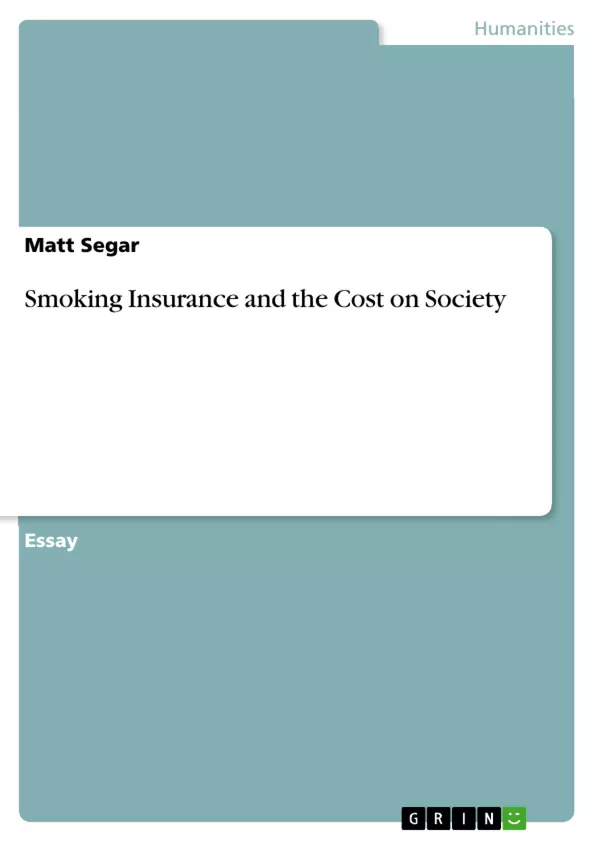Throughout world history, civilizations have used tobacco for spiritual rituals, social tools, and pleasure. In the United States, tobacco was a major crop that helped bring wealth to the country. Nowadays, smoking has taken a serious hit socially with many anti-smoking campaigns branching out nationwide. Many proclaim that since smokers are more likely to get ill and rack up healthcare costs, they must pay higher insurance rates. Smoking, however, is a choice that should not correlate to higher insurance costs.
Inhaltsverzeichnis (Table of Contents)
- Smoking Insurance and the Cost on Society
- Arguments for Increasing Premiums
- Smoking is Not a Financial Burden on Society
- Smoking and Health Risks
- Other Risky Behaviors
- Conclusion
Zielsetzung und Themenschwerpunkte (Objectives and Key Themes)
This paper analyzes the economic impact of smoking on society, specifically focusing on the relationship between smoking and healthcare costs. The author argues that smoking should not correlate to higher insurance premiums, challenging the common perception that smokers are a financial burden on healthcare systems.- Economic impact of smoking on society
- Relationship between smoking and healthcare costs
- Arguments against increasing insurance premiums for smokers
- Health risks associated with smoking
- Comparison of smoking to other risky behaviors
Zusammenfassung der Kapitel (Chapter Summaries)
- Smoking Insurance and the Cost on Society: Introduces the topic of smoking and its social impact, highlighting the debate surrounding higher insurance premiums for smokers. The author presents the opposing arguments for and against increased premiums, focusing on the cost of smoking-related illnesses to the healthcare system.
- Arguments for Increasing Premiums: Presents the main argument used by supporters of increasing insurance premiums for smokers: smokers incur high healthcare costs due to smoking-related illnesses, thus justifying higher premiums to offset these expenses.
- Smoking is Not a Financial Burden on Society: The author argues that smokers are not a financial burden on society, citing three major studies that demonstrate the potential cost savings associated with smokers dying earlier. These studies analyze the net costs and savings related to smoking, taking into account factors like nursing home care and pensions.
- Smoking and Health Risks: While acknowledging the health risks associated with smoking, the author challenges the notion that smoking is the sole cause of smoking-related illnesses. The author highlights research on genetic factors and the potential role of socioeconomic conditions in influencing smoking behavior.
- Other Risky Behaviors: The author criticizes the selective focus on smoking as a reason for higher insurance premiums, pointing out that other risky behaviors, such as obesity, failure to use seatbelts, and sedentary lifestyles, also contribute significantly to healthcare costs.
Schlüsselwörter (Keywords)
This paper primarily focuses on the economic and social implications of smoking, examining arguments related to insurance premiums, healthcare costs, smoking-related illnesses, and alternative perspectives on health risks and behavior. The author challenges the notion that smokers are a financial burden on society and advocates for a more comprehensive approach to addressing health risks and healthcare costs.Frequently Asked Questions
Should smokers pay higher health insurance premiums?
The author argues against higher premiums, challenging the idea that smoking should correlate to insurance costs and questioning whether smokers are truly a financial burden.
Are smokers a financial burden on society?
According to studies cited in the paper, smokers may actually save society money because they tend to die earlier, reducing long-term costs like nursing home care and pensions.
What factors besides smoking influence health risks?
The author points to research on genetic factors and socioeconomic conditions that may play a significant role in the development of illnesses often attributed solely to smoking.
How does smoking compare to other risky behaviors?
The paper criticizes the selective focus on smoking, noting that behaviors like obesity, lack of exercise, or not using seatbelts also contribute significantly to healthcare costs but are often treated differently.
What is the historical significance of tobacco in the US?
Tobacco was historically a major crop that contributed significantly to the wealth and economic development of the United States.
- Quote paper
- Matt Segar (Author), 2010, Smoking Insurance and the Cost on Society, Munich, GRIN Verlag, https://www.hausarbeiten.de/document/210750


